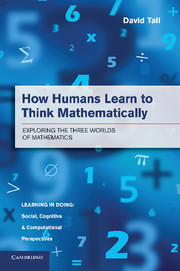Book contents
- Frontmatter
- Dedication
- Contents
- Series Foreword
- Journeys through three worlds of mathematics
- Preface
- Acknowledgements
- Illustration Credits
- I Prelude
- II School Mathematics and Its Consequences
- III Interlude
- IV University Mathematics and Beyond
- 10 The Transition to Formal Knowledge
- 11 Blending Ideas in the Calculus
- 12 Expert Thinking and Structure Theorems
- 13 Contemplating the Infinitely Large and Small
- 14 Expanding the Frontiers through Mathematical Research
- 15 Reflections
- Appendix Where It All Came From
- References
- Index
10 - The Transition to Formal Knowledge
from IV - University Mathematics and Beyond
Published online by Cambridge University Press: 05 June 2014
- Frontmatter
- Dedication
- Contents
- Series Foreword
- Journeys through three worlds of mathematics
- Preface
- Acknowledgements
- Illustration Credits
- I Prelude
- II School Mathematics and Its Consequences
- III Interlude
- IV University Mathematics and Beyond
- 10 The Transition to Formal Knowledge
- 11 Blending Ideas in the Calculus
- 12 Expert Thinking and Structure Theorems
- 13 Contemplating the Infinitely Large and Small
- 14 Expanding the Frontiers through Mathematical Research
- 15 Reflections
- Appendix Where It All Came From
- References
- Index
Summary
This chapter considers the challenges that students face as they make the transition from the embodiment and symbolism of school mathematics to formal mathematics at university based on set-theoretic definition and formal proof. The framework of three worlds of mathematics will be used to analyze supportive and problematic aspects of fundamental definitions including sets, relations, functions, equivalence relations and order relations. There follows a review of the formal construction of the real numbers and how students attempt to make sense of the concept of limit in mathematical analysis. This reveals a spectrum of different personal conceptions from ‘natural’ approaches based on previous meanings of embodiment and symbolism to a ‘formal approach’ based on making deductions from formal set-theoretic definitions. The chapter analyses how some students ‘give meaning’ to the definition from their embodied and symbolic experience, and some ‘extract meaning’ directly from the definition by learning to formulate formal proofs from formal definitions, with varying levels of confidence and disaffection, depending on the supportive and problematic aspects of their development. Various different methods of analysis of data are considered and related to the long-term framework for mathematical thinking presented in this book.
Major Changes from Embodiment and Symbolism to Formalism
The shift from the practical and theoretical development of embodied objects and symbolic operations to the formalism of axiomatic systems involves significant changes in meaning. A student who has studied Euclidean geometry has experience of building a knowledge structure where theorems are deduced from axioms and previous theorems. However, this involves principles such as congruence or the properties of parallel lines rather than the quantified set-theoretic deductions in formal proof. Meanwhile, proof in arithmetic and algebra, based on the ‘rules’ of arithmetic, is also a useful prelude to formal proof from axioms.
Information
- Type
- Chapter
- Information
- How Humans Learn to Think MathematicallyExploring the Three Worlds of Mathematics, pp. 255 - 288Publisher: Cambridge University PressPrint publication year: 2013
